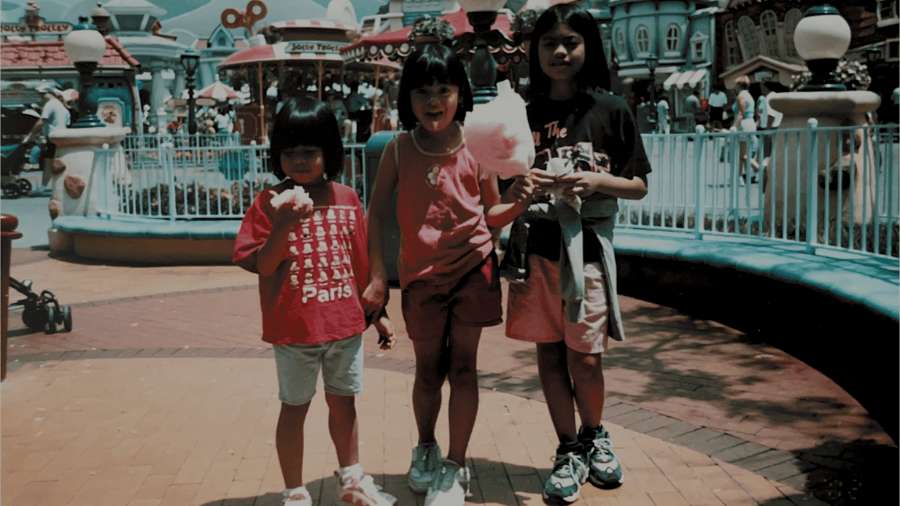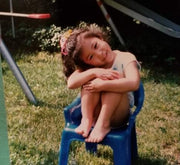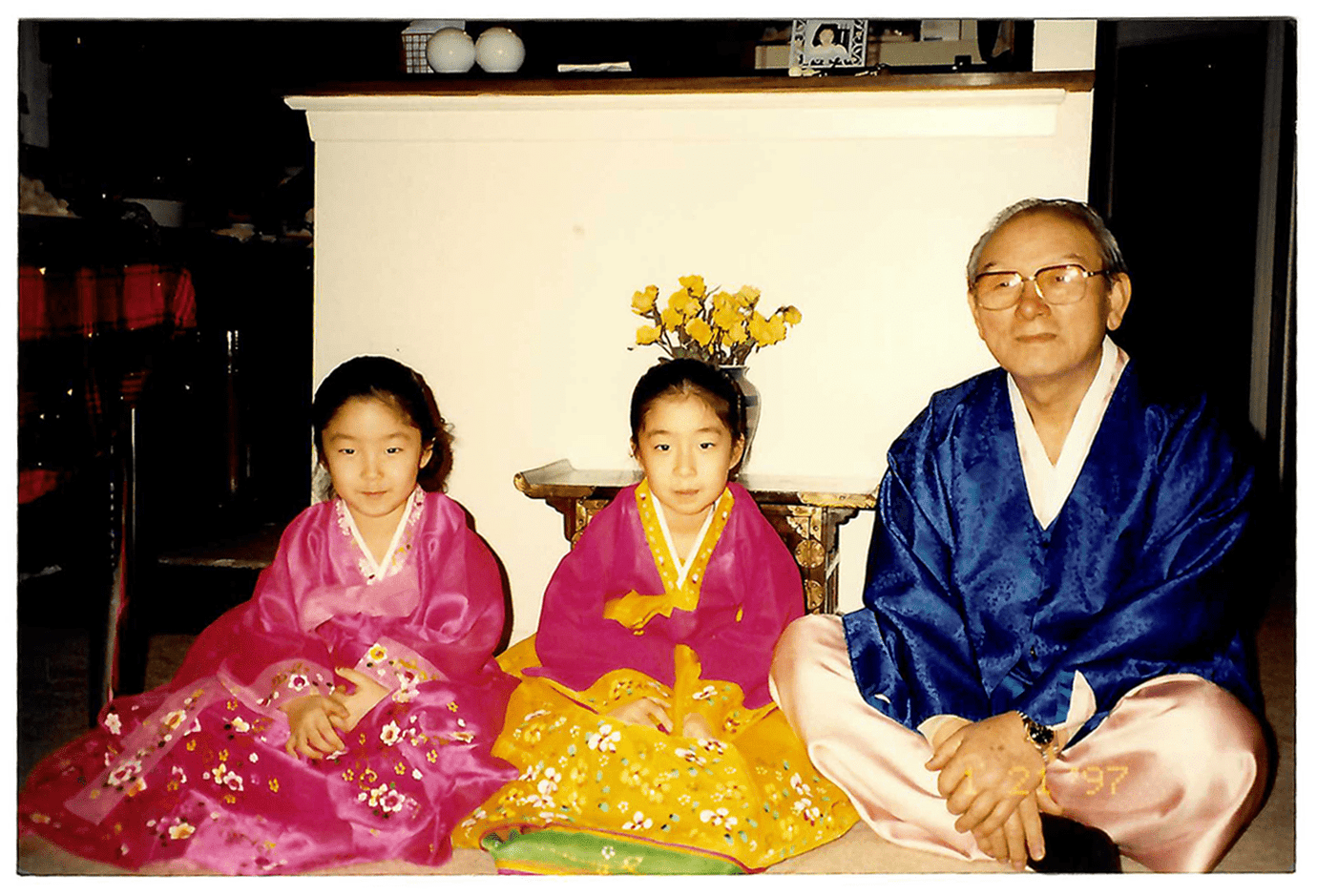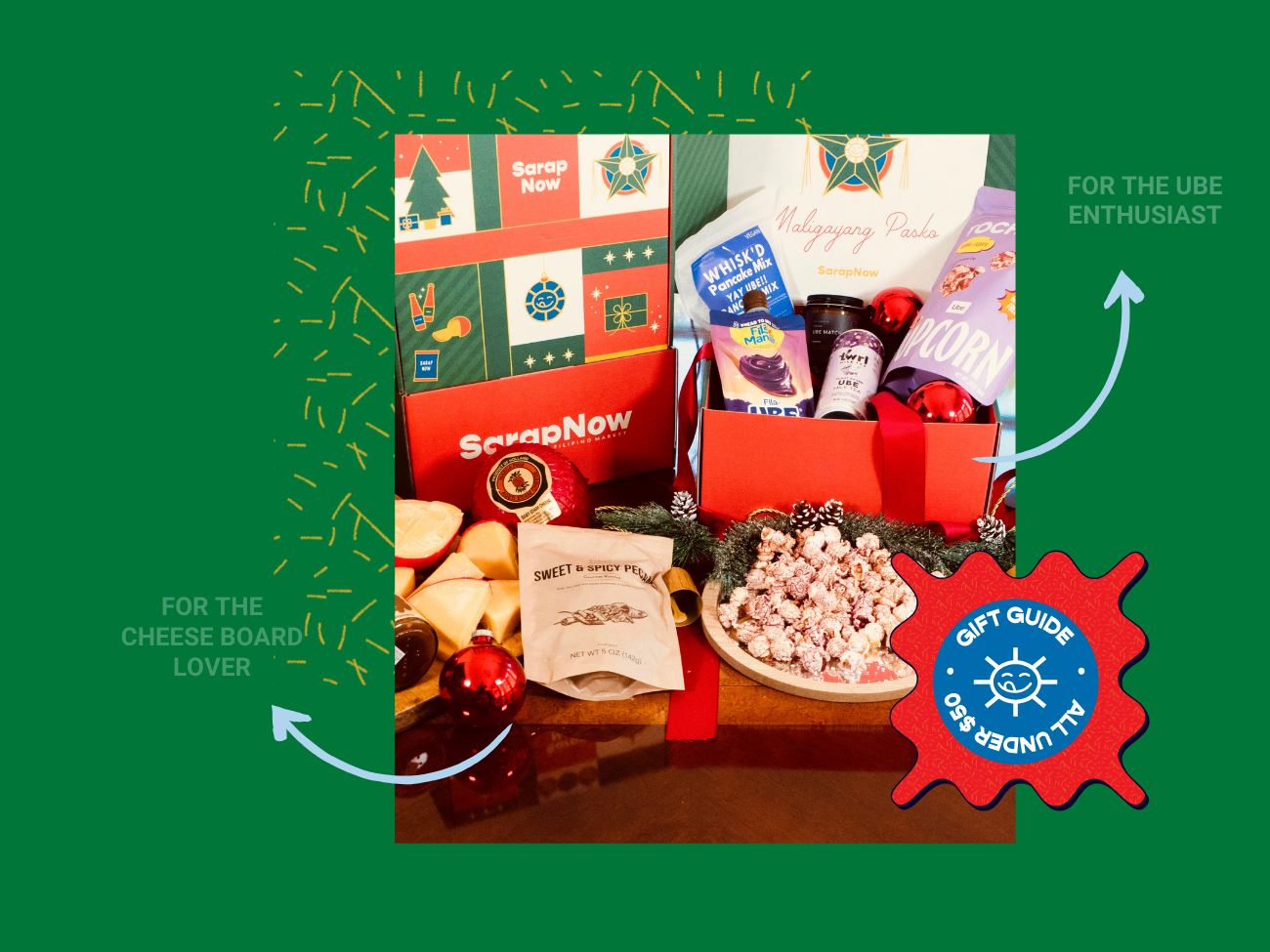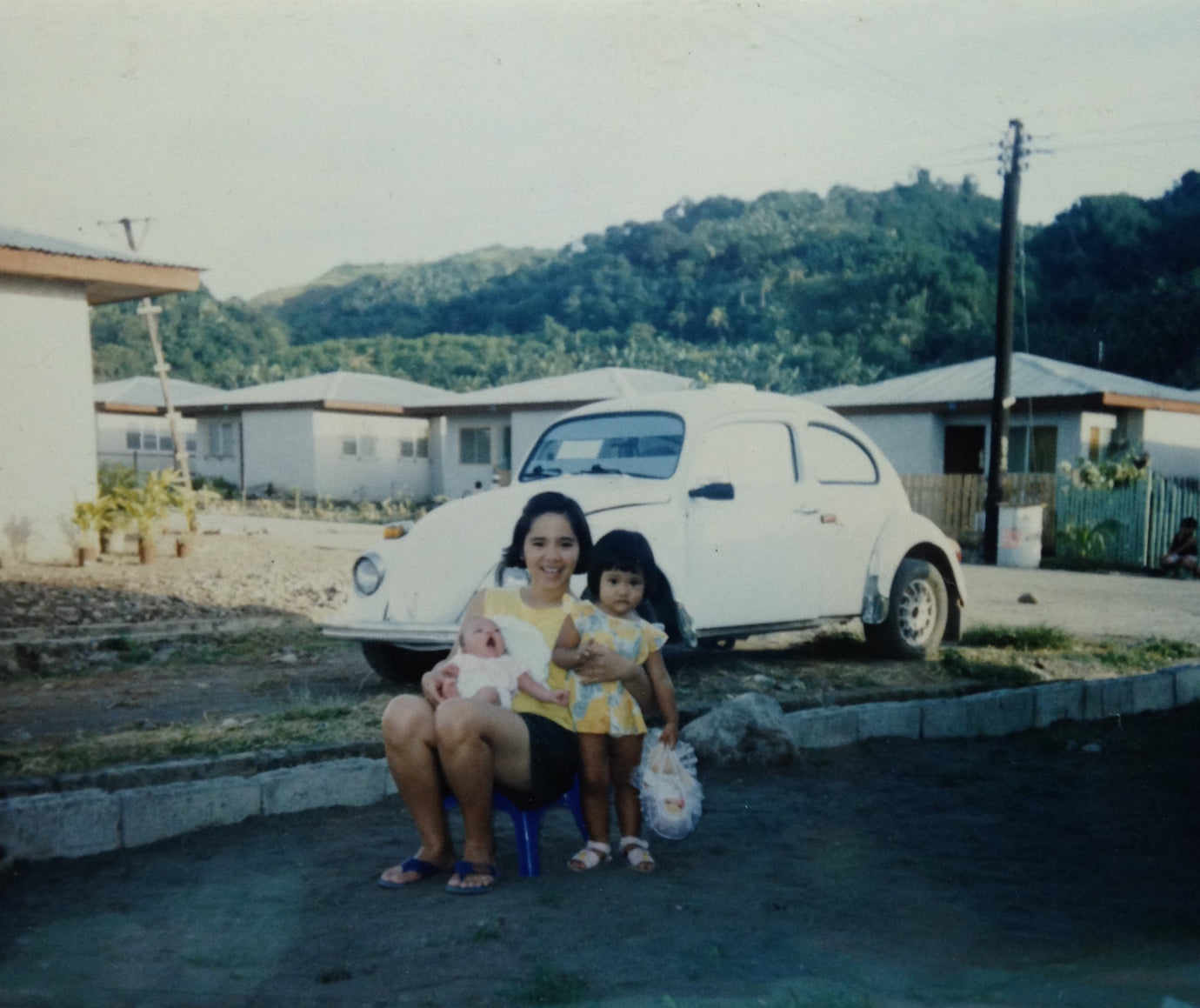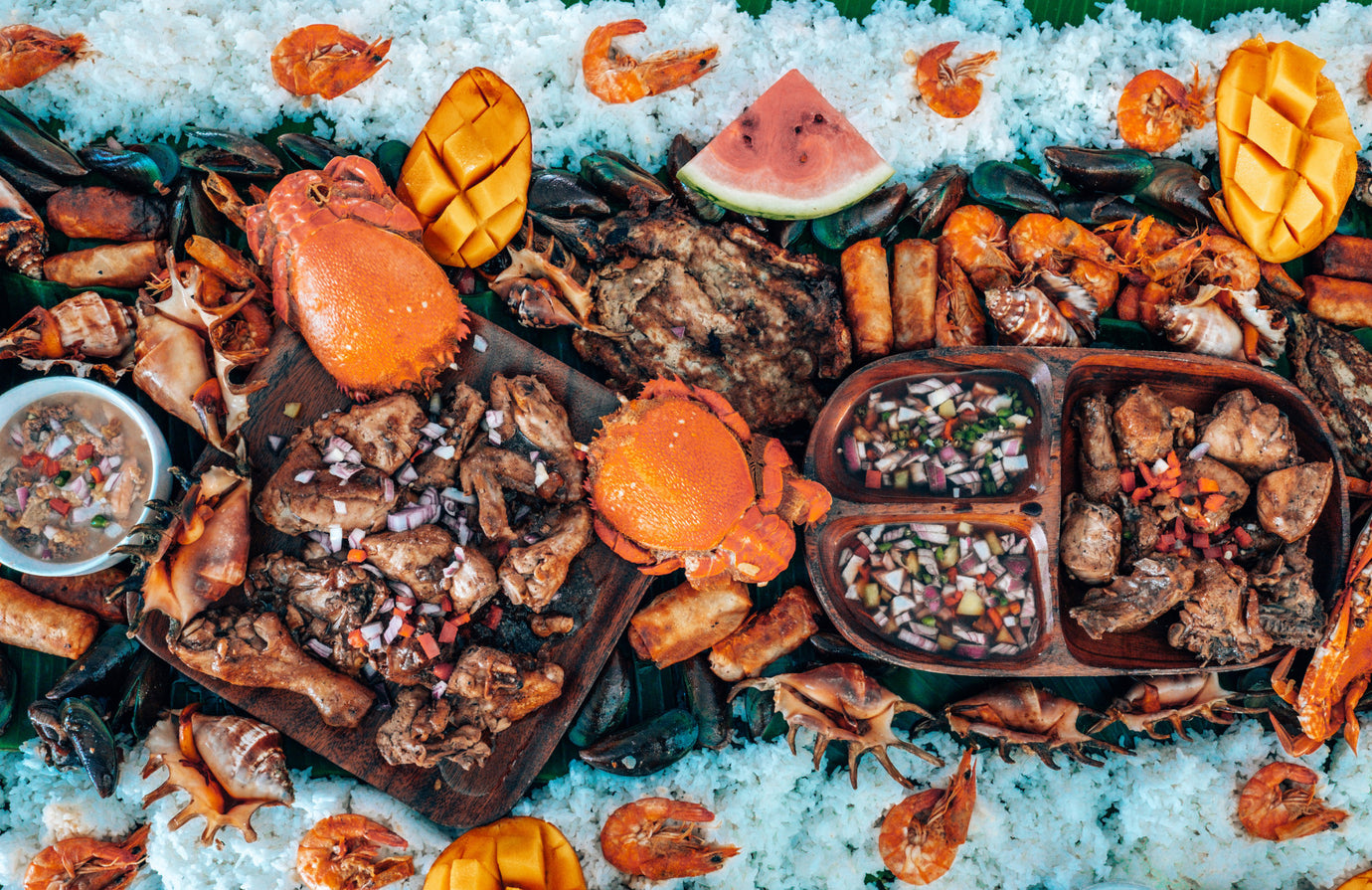Welcome to Sarap Stories - your space for Asian American representation, inspiration, and insights from real AAPI makers in the Sarap Now marketplace.

Source: Abi Balingit
For Abi Balingit, baking is more than a quarantine-era hobby – it’s a salvation of her Filipino American identity. In her brand-new dessert cookbook Mayumu (which means “sweet” in Kapampangan, her parents’ native language), the author channels her imaginative self into each recipe.
From growing up in the strong Filipino communities of California to finding belonging in New York City, she melds her life experiences into a collection of creative treats.
The book is chock-full of delightful combinations of savory and sweet, Filipino and Western, and flavorful and fun, for everyone to indulge in (oh hello, Adobo Chocolate Chip Cookies). Every delicious morsel reflects her desire to preserve her culture for generations to come.
Read on to see how Abi emerged from a cloud of flour in her dusky Brooklyn apartment to blaze a trail for new generations of Asian American bakers. Spoiler alert: she followed her heart.
This interview has been edited for length and clarity.
Tell us about yourself - your name, pronouns, and your blog and book. Do you identify as AAPI or an immigrant of Asian heritage?
My name is Abi Balingit and my pronouns are she/her. I'm 28 years old and I live in Brooklyn. Full-time, I work as a live music marketing manager. I started my blog The Dusky Kitchen in the summer of 2020, when I began writing about Filipino-inspired fusion desserts. I was also selling pasalubong (“souvenir” in Tagalog) treat boxes and donating the proceeds to local mutual aid organizations like Bed-Stuy Strong.
Writing my cookbook Mayumu: Filipino American Desserts Remixed was a whirlwind. I’ve spent the past few years on it. A literary agent found me in the fall of 2020, I got a contract the following year, and I wrote the book in 2022. It’s so exciting to see my book – a whole book on Filipino American flavors and treats – finally out in the world!
I identify as AAPI for sure. I’m a child of immigrants. My parents immigrated to the U.S. in the 90s. They’re both from Pampanga. My Dad went to work in Saudi Arabia for a little bit from 1985 to 1992. After they got married, my Mom came to America first and she brought him over. I have two sisters and I’m the middle child.
 Source: Abi Balingit
Source: Abi Balingit
What was your experience like growing up in America?
Honestly, I'm really lucky. I talk about this in the book, but I was always surrounded by Filipinos and the Filipino American (Fil-Am) community. Even outside my family, my parents’ friends are Filipino. A lot of our neighbors were Filipino and we would hang out with their kids.
I was born in San Jose, California and moved to Stockton when I was six – both have big Filipino communities and historical significance to Fil-Ams. It was really special because it wasn't a weird thing to be Filipino. It was actually very common and normal! I moreso felt like, who isn’t Filipino? After talking to a lot of other people, I realized that this isn’t the case for everyone. I acknowledge that I had a pretty unique experience.
I felt surrounded by lots of love and warmth, so naturally, loving our food and taking pride in my identity felt like a given. I’ve been able to really own who I am and be true to myself because of my upbringing.
 Source: Abi Balingit
Source: Abi Balingit
Do you remember the first time you felt represented in your career or the food world? Tell us about those memories and what they meant to you.
There’s not this one person, one idol, or one icon, but yes, there are so many people that allowed me to feel like, oh yeah, it’s cool to be Filipino and do creative things. I especially found this in my peers.
For example, I love everything that Kimberly Camara at KORA donut shop does. Kim is one of those bakers who I really admire – I see what they’re putting out there and I just think, wow, you're doing an amazing thing! I started around the time KORA really blew up in 2020 and I was so inspired by her.
Her donuts are the best I've ever had, Filipino or not-Filipino. I’ve ordered them multiple times and their success is huge. The only thing that's unfortunate for me is that it’s really hard to get the donuts now!
What inspired you to create The Dusky Kitchen and Mayumu? Walk me through what led you to those moments.
I've been baking since I was 13, but I was compelled to try making Filipino desserts because of quarantine. I missed my family so much during that time and it was my way of finding comfort.
I am a little ashamed because it actually took me a long time to try to make Filipino food on my own. I was nervous because I had such high expectations from my parents’ and family’s cooking. I thought what I made wouldn’t measure up to what they traditionally make.
But once I followed my heart and began trying, baking became a therapeutic thing where I also felt salvation – I was on a mission to preserve my culture. I was motivated by not knowing when I’d see my family next, but also by the desire to do it for myself. I understood that all my cultural knowledge could end with me if I didn’t share it.
New York also has this creative energy. A lot of people during quarantine were baking to raise funds for mutual aid organizations, inspired by Bakers Against Racism. In the wake of the Black Lives Matter protests, so much felt overwhelmingly wrong, unjust, and awful. Baking was a way to help out and it also acted as therapy. It allows you to put all this upsetting energy into creating something nice, comforting, and beautiful.
That was why I started doing the pasalubong treat box – I was already baking for my roommates in my apartment. I began giving desserts to other people, collaborating with organizations, and partnering with a group of bakers I love called Bowl Cut Table. All of that happened organically.
For the cookbook, my soon-to-be literary agent came up to me on Twitter! She asked if I’d be interested in writing a cookbook and I was like, “Well now I am.” It happened organically, like I fell into something that I’ve always been really passionate about.
When I was writing Mayumu, I had all this inspiration from foods that I love and grew up with, like halo-halo, ube, and jackfruit. It was fun to play around with Filipino and American flavors – or at least, what I consider to be American, which is so broad.
When I go to a restaurant, I don't just take away that the food was good – it’s the details that sit with me. All my experiences, small and large, contributed to the way that I think about desserts and baking. It’s really fun to present yourself on a plate.
What came first – Mayumu or the Adobo Chocolate Chip Cookies recipe?
The Adobo Chocolate Chip Cookies happened in the process! I was always excited about combining Filipino savory flavors in desserts. Adobo kept popping up in my Mayumu brainstorming sessions and I knew I wanted to do a fun mash-up with it.
In what ways has being Asian American impacted or inspired your journey as a baker and cookbook author?
Being Filipino American and Asian American is a huge part of my journey. I don't think Mayumu would exist if it didn’t center on my life.
I love that the stories I share in the book are inspiring for different generations. Many young people see it on the road or in-store and get super excited about new ways for people to interpret Filipino food.
There are a lot of dessert cookbooks out there about cookies and brownies, but my book gets to tie those classics in with traditional Filipino flavors. For example, I made a recipe for a Strawberry Shortcake Sapin-Sapin (a tri-layered rice cake).
Writing the book was an insular, solo endeavor because you're pretty much all in your head. You don't know if this is going to do well. You don’t know if people will like it at all.
It’s cool to see that Filipinos and non-Filipinos have made my recipes, especially because many people can be intimidated by bold flavors or new combinations they haven't seen before. These days, there’s so much inventiveness and creativity in the Asian American community, and I’m just happy it gets to be shared.
This book inspires people to try something for the first time, and that gives me hope. I’m always like, don't knock until you try it. I hope my cookbook can inspire more people to keep an open mind.
Tell me about a challenge you faced to get to where you are today, and how you overcame it.
Many editors actually rejected the book before two people said yes. My agent Emmy was really nice about it – they supported the book no matter what. They told me that even if no one says yes, we’ll try again. It was really helpful to have someone in my corner.
We took each rejection as an opportunity to get constructive feedback and refine the proposal for the next editor. They’d be like, this is a great idea, but Abi doesn’t have this amount of followers, and Filipino food is already so niche. It was hard to not be hurt because it was such a personal project, but I got used to taking the criticism and turning it into something positive.
Some people didn’t give me the time of day because they didn't necessarily understand the value of my story. The objective of many publishing houses is to sell books. Ideally, as an author, you also want to sell books. So we’re all on the same page, but some editors just prescribe value differently.
The two editors who ended up saying yes were both Asian American. They were so supportive and saw exactly what I was trying to do.
When one person in a room of a hundred people says yes, that's all that matters. As times change, I’d like to think that more people are advocating for and believing in people that look like me. It made a difference in my case.
AAPI representation matters. Why does it matter to you? What do you think needs to happen to make more progress with representation?
Representation is inspiring and can help you feel like anything is possible. But representation is the first step – one Asian person achieving something is not a cure-all.
Sometimes when I’m categorized as “the Filipino American baker,” I'm like, nope. I'm not the sole expert. I'm not perfect. And that's okay. I know my stuff pretty well, but I'm always becoming a better baker.
When you see representation, it's good to be critical, ask questions, and seek out other opinions or expertise. Consume something and enjoy it, but also use it as a jumping-off point to learn more about it outside of that one source.
To make progress with representation, I believe we need to engage with representation - whether it’s through the lens of food, writing, or any kind of art - and create consistent dialogue around it. That way, there’s more learning about each other through the process.
We’re not getting the most out of representation if we're just letting that one “win” become a trophy or a checked box. It’s not the end-all, be-all. We need to have representation as well as a healthy infrastructure around it, such as conversation and support to do things differently than they’ve already been done.
I want this book to do well and I’m happy with the success it’s having, but I do feel the pressure since Filipinos have little representation to begin with. I don't want to be the book that messes everything up for everyone else. I want Mayumu to open doors for other people to have their stories told, without question or any pushback. So there can be a million other Filipino dessert books, cookbooks, or all kinds of books!
Also, I am not the only Filipino American baker who's doing amazing things. I have so many favorite bakers and bakeries that are doing incredible work - not just Filipino Americans, but also Filipino British, Filipino Australians, and so many of us, everywhere. Especially in the motherland, there are so many cooks in the Philippines that deserve attention as well.
The whole Filipino ecosystem feels like a quilt, honestly, and I'm just adding a square.
Do you have any tips for aspiring AAPI makers who want to get into food blogging or write their own cookbooks?
Just do it.
This one is especially for people who are food writing or doing any type of writing – just do it. I know that seems cliche, but putting in the practice of writing is the most important thing. I consider myself a late bloomer when it comes to food writing because I was blogging and writing thoughts on my own website – but I was doing exactly what I needed to. Sometimes you get caught up in trying to get bylines in The New York Times, but you can get stuck with that mindset. Start writing now and good things will happen over time.
Ask for help.
It’s always okay to ask for help. In my case, I don't have a conventional path to writing or being an author. Talking to other authors and writers helped me feel like it was doable. I didn’t follow the same playbook as them but you realize that they’re paving their own way, and you can make your own way too. People are much more open than you realize to help out.
Follow your heart and do what you love.
In my book’s dedication, I mention that my parents used to say to me, “Bahala ka sa buhay mo,” which roughly translates to “Do whatever you want with your life!” Once you take all the passive-aggressive stuff out of it, it’s pretty great advice. You can do so much if you follow your heart, do what you set your mind to, and ignore whatever else other people are saying.
I'm lucky my parents are pretty supportive of me. It's hard because they have expectations of me too - that I need to have financial stability, keep my job, and make sure I have health insurance. All these things are such real tangible stresses.
But, think of yourself first and foremost. What makes you happy? Do that. It doesn’t have to be your full-time job. It can be a hobby - something just for fun and just for you. Ruby Ibarra was a scientist. You can do anything.
I'm still navigating this, too. I don't wanna glorify overworking yourself and doing the most – it's important to balance rest and make sure that you feel good about your work and what you do.
What advice would you give to a younger version of yourself?
I would tell her that it's okay to be vulnerable and open. That's a part of writing that I didn’t realize would be so important. While I was writing my book, I realized I had to talk about myself and my life. I never really thought those things would be important to share, but I’m glad that I did because so many people see themselves in my story.
I also would tell my younger self to know her value and own that worth. Even now, something I'm really working through is feeling confident, no matter what life throws at me.
What’s something you love about your culture that you wish more people knew about?
In my Filipino cultural group in college, we would say “Isang Bagsak,” or “One Down.” It’s a phrase that originates from Filipino labor organizer Larry Itliong – he shared it with fellow activist César Chávez during the farm labor movements of the 1960s. Itliong and Chávez would unite Filipino and Latino migrant workers together using the phrase and a “unity clap” at the end of a long work day.
We continued this tradition at our group’s meetings and events. We would get in a circle together, say “Isang,” clap in unison, and “Bagsak.” It would hype everyone up!
Out of everything I've taken away from being in the Filipino community, it’s that we all rise together and we all fall together. It’s really important in our culture to lift each other up.
I don't think people realize why this is important, in terms of our history. There's so much solidarity, fighting for our rights, and fighting for our loved ones.

Source: Abi Balingit
What’s your favorite childhood snack?
I really, really love turon (fried banana spring roll). Like, the foot-long turon from Seafood City – the long, skinny ones. I could eat a lot of turon.
I could also recognize Eng Bee Tin ube hopia from a mile away. It’s a childhood thing – I just know the packaging so well. The last time I was in the Philippines, my family gave me some to take home.
Shameless plug time! What’s next for you? Anything else you’d like to share?
I hope that people continue to read Mayumu. If someone reads the book, enjoys it, or gifts it to their family or friends - I’m happy! As for what’s next for me, I’m still promoting the book, but I’m going wherever the river takes me. Follow me on Instagram at @theduskykitchen for updates.
Win A Signed Copy of Abi’s Cookbook
Enter our giveaway until May 31st to win a signed copy of Mayumu plus over $550 worth of AAPI-made goodies from the Sarap Now marketplace.

